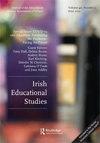Experiential, relational, playful pedagogy in Irish primary schools – possibilities offered by Forest School
IF 1.2
4区 教育学
Q2 EDUCATION & EDUCATIONAL RESEARCH
引用次数: 0
Abstract
ABSTRACTForest School, an experiential, nature-based pedagogy is attracting considerable interest in Ireland presently. This paper presents findings from the first national survey of Forest School pedagogy in Ireland, conducted in 2019–2020 as part of a larger study. The aim of the survey was to find out how Forest School pedagogy is understood by adults in Ireland who are interested in Forest School. Potential survey respondents were identified through the networks of the Irish Forest School Association. The survey included 5 open-ended questions to explore respondents’ understanding of Forest School and 63 five-point Likert items to explore attitudes to environmental and pedagogical issues. A purposive sampling strategy yielded 232 responses. Data analysis comprised thematic analysis of the qualitative dataset and exploratory factor analysis of the Likert items. The respondents describe Forest School pedagogy as experiential, relational, playful learning with(in) nature, where the adult acts as facilitator or mentor. Respondents trained as Forest School Leaders held more progressive pedagogical views and a more pro-environmental worldview than other respondents. The findings suggest that Forest School pedagogy offers possibilities towards delivering progressive pedagogy and supporting wellbeing and flourishing for all through widening our definition of school to include nature as a pedagogical partner.KEYWORDS: Forest Schoolnature-based pedagogyexperiential learningprimary schoolrelational pedagogy Disclosure statementNo potential conflict of interest was reported by the author(s).Notes1 The fifth question asked respondents how they heard about Forest School. The analysis is not included in this paper for space reasons.2 Various (2%) comprised five responses that did not fit elsewhere: learning without borders; respectful; self-esteem; dialogue and length of programme.3 This comment was included in a final question ‘Any Other Comments’Additional informationNotes on contributorsJoan WhelanJoan Whelan currently holds a post-doctoral research position on the Erasmus + APOLE (Adventurous Play and Outdoor Learning) project in the School of STEM Education, Innovation and Global Studies at the Institute of Education, Dublin City University. She competed her PhD in Dublin City University in 2022. Her thesis explored the possibilities offered by Forest School as caring pedagogy in the primary school. Previously she worked as a primary school principal in Dublin city until her retirement in 2016. She was a founder member of the Irish Forest School Association in 2016 and is currently chairperson. Her research interests are focussed on the possibilities offered by nature-based pedagogies and outdoor education more generally towards making schools more embedded in, and responsive to, the communities they serve.Orla KellyOrla Kelly is an Associate Professor in Social, Environmental and Scientific Education in the School of STEM Education, Innovation and Global Studies at the Institute of Education, Dublin City University, which she joined in 2016. She has worked in initial teacher education for over 15 years in both Ireland and the UK. She leads and teaches across a number of modules at undergraduate and postgraduate level in a diverse range of areas including Science Education, Sustainability, Outdoor Learning and Local Studies. She is a highly experienced researcher and has successfully led and collaborated on a number of national and international projects. She is currently a partner on the Erasmus + APOLE (Adventurous Play and Outdoor Learning) project. She has a growing publication record in the area of outdoor learning, which is her main focus for research. She has a national reputation as a leader in outdoor learning and regularly supports the work of the National Council for Curriculum and Assessment (NCCA) in Ireland in this area for both Early Years and Primary.爱尔兰小学的体验式、关系式、趣味性教学法——森林学校提供的可能性
摘要森林学校作为一种体验式的、以自然为基础的教学法,目前在爱尔兰引起了相当大的兴趣。本文介绍了爱尔兰森林学校教学法的第一次全国调查的结果,该调查于2019-2020年进行,是一项更大研究的一部分。这项调查的目的是了解爱尔兰对森林学校感兴趣的成年人对森林学校教学法的理解情况。潜在的调查对象是通过爱尔兰森林学校协会的网络确定的。调查包括5个开放式问题,以探讨受访者对森林学校的理解和63个五点李克特项目,以探讨对环境和教学问题的态度。一个有目的的抽样策略产生了232个回应。数据分析包括定性数据集的专题分析和李克特项目的探索性因子分析。受访者将森林学校的教学法描述为体验式的、关系式的、与自然相关的、有趣的学习,其中成人扮演促进者或导师的角色。接受过森林学校领导培训的受访者比其他受访者持有更进步的教学观点和更亲环境的世界观。研究结果表明,通过扩大我们对学校的定义,将自然作为教学伙伴,森林学校的教学法为提供渐进式教学法和支持所有人的福祉和繁荣提供了可能性。关键词:森林学校自然教学法体验式学习小学关系型教学法披露声明作者未报告潜在的利益冲突。注1第五个问题询问受访者是如何听说森林学校的。由于篇幅的原因,本文没有对其进行分析各种(2%)包括五个不适合其他地方的回答:无国界学习;尊重;自尊;对话和节目长度这条评论包含在最后一个问题“是否有其他评论”中。附加信息:撰稿人joan Whelan joan Whelan目前在都柏林城市大学教育研究所STEM教育、创新和全球研究学院的Erasmus + APOLE(冒险游戏和户外学习)项目中担任博士后研究职位。2022年,她在都柏林城市大学攻读博士学位。她的论文探讨了森林学校作为小学关怀教学法所提供的可能性。此前,她曾在都柏林市担任小学校长,直到2016年退休。2016年,她是爱尔兰森林学校协会的创始成员,现任主席。她的研究兴趣集中在以自然为基础的教学法和户外教育所提供的可能性,更普遍地使学校更加融入他们所服务的社区,并对社区做出反应。Orla Kelly, 2016年加入都柏林城市大学教育研究所STEM教育、创新与全球研究学院,担任社会、环境与科学教育副教授。她在爱尔兰和英国从事初级教师教育工作超过15年。她在科学教育、可持续发展、户外学习和地方研究等不同领域领导和教授本科生和研究生水平的多个模块。她是一位经验丰富的研究人员,并成功领导和合作了许多国家和国际项目。她目前是Erasmus + APOLE(冒险游戏和户外学习)项目的合作伙伴。她在户外学习领域的出版记录越来越多,这是她的主要研究重点。作为户外学习的领导者,她在全国享有声誉,并定期支持爱尔兰国家课程与评估委员会(NCCA)在这一领域的学前和小学工作。
本文章由计算机程序翻译,如有差异,请以英文原文为准。
求助全文
约1分钟内获得全文
求助全文

 求助内容:
求助内容: 应助结果提醒方式:
应助结果提醒方式:


